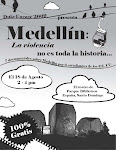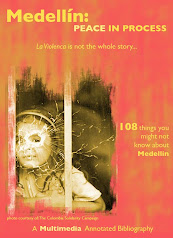"The best way to describe the difference between the two stories we are working on is what my compañero said when I told him about my work over the past week: “Que Vuelta”. Both stories are incredibly interesting and our subjects are incredibly engaging and fascinating to listen to. They do, however, come from different worlds. While the students who have received the EPM grants need the money to study, the women who work in the sewing room at Itagui have different backgrounds. To put it plainly, they have much less. They come from nothing. For them studying was never an option because they have always had to work some job or another. This is not to say the students we are interviewing are not hard working. On the contrary, all the students we have spoken to seem to work 10 times harder than most American students and sleep ten times less.
This Monday after a morning editing our footage we headed to the nacional to film more interviews with Jorge and Viviana, our main subjects for the “students” documentary. After we filmed they invited us to go have a drink at the Iguana, the notorious hole in the wall bar in front of the Nacional that caters to thirsty architects and engineers. When we walked up we were introduced to big group of their friends who were making good progress through a bottle of Aguardiente. They invited us to join in and we spent the next four hours drinking Aguardiente and dancing salsa, merengue, vallenato and reggaeton. One of the best things about being a gringa is that everyone wants to teach you to dance, and Allison and I barely spent a moment seated It was like going to the Tibiri. On a Monday afternoon. On the first day of classes. It was an experience that I could have never had at Duke. It was one of the best days I’ve had here in Medellín.
On Tuesday we made our back to the rooftop of Itagui, to the sewing class. After spending a week getting to know the women, eating pan de queso and exchanging jewelry, we began our interviews. We interviewed both teachers, Jorge and Jaime, and their answers were incredibly beautiful. Both men talked about the class as a tool the women were being given to help give them a new opportunity, a new life. It is clear that these men are special, that their job is clearly not solely to make ends meet. These men are invested in the women they teach and it shows, during class and in the answers they gave us.
We began to interview the women. They were all incredibly eager to participate in the documentary and we began going down the line of sewing machine, asking each woman the same set of questions. My heart nearly broke during our interview of one woman, Erica. She began the interview but stating that she was a very humble woman, of a very low class. We learned that she has 3 children and is attending the class to hopefully find work to help her children someday be able to study and attain a better life than she has had. Her happiest memories are the births of all her children. I faltered, I was nervous to ask her what her saddest memory was. I didn’t know if she would feel comfortable sharing it with us. She paused and then gazed up to answer. Her saddest memory was when one of her children fell ill. She had no insurance and no resources to be able to help her sick child. Her saddest memory was when she had no other options but to go out on the street and beg. This wonderful, proud, hardworking woman found herself in such straits she had to beg. Hours later I still cannot fully wrap my mind around this. How do I justify the 200-dollar camera I am using to film a woman who cannot afford healthcare? I was stricken by the memory she had just confided in us and all I could do was give her a hug and a kiss.
The work we are doing is varied and one day differs drastically from the next. The people we are meeting her are making an impact on me that I will surely remember for the rest of my life. I wish we had more time to spend with these people."
"
The women in the sewing class in Itagüi are impressive. They are open, honest, and bold. When Danya and I interviewed the class on Tuesday, they replied sincerely, without appearing to want anything in return.
I could not believe that the women were willing to share such intimate details of their lives with us. For the questions we asked, we got very truthful, real answers. If I am honest with myself, I expected for them to hold back a little bit. If someone asked me what my saddest memory was I do not think I would respond with something that would bring tears to my eyes. But they blew me away. One woman told us about how she had to beg for food when someone in her family was sick, another said her saddest memory was when her husband was very ill. Yet another told us that her quince was her happiest memory, while another woman cited that she was most happy after her children were born.
All of the women who participated in our questions were open; that much was clear. Some were frank about information on their lives, while others were clear that they did not want to participate. For this reason, I think our documentary will be stunning.
In addition to being amazed with their ability to share private experiences with us, I was also so excited to see how daring these women were. As Jaime (one of the sewing teachers) said, this class helps the women improve as people, women, mothers, caretakers, sisters, daughters, and wives. These women had the opportunity to do something for themselves, and they took it. I think that is bold. They wanted something, and they had the audacity to go after it.
My parents have always taught me that education is one of the most powerful tools to have and use. I understood this when I went to Nicaragua and I saw people learning how to save money for the first time. Now I understand that these women will change their lives and their families’ lives by acquiring the skill to sew. I hope that they continue to share this lesson with the other women they know, because it is powerful (and empowering) to be able to provide for your family from skill you were taught."
"Almost everywhere I go in Comuna 13, from Parque Biblioteca San Javier, to the cancha in El Salado, to El 20 de Julio, I see kites soaring in the air, big and small, colorful or plain. They are plastic, and they are homemade. Sometimes they are no more than a piece of curled paper tied to a string catching short breezes of wind.
What has struck me the most about everyone that I’ve talked to in Comuna 13 is that despite everything that they may have gone through, from seeing children running around with guns in their hands to being accused of being a FARC commander and jailed, these people still have high hopes and dreams. Instead of being weighed down by sadness and fear and becoming angry, mistrustful people, their spirits, like the kites, soar.
One of these ambitious individuals was Jake Thomas Randall, or as he’s more popularly known, “Randall Super Jake,” a Reggaeton artist who runs his own television show, Zona VIP, in a small studio tucked away in the corners of Comuna 13. During Operation Orion in 2002, Jake was caught in the wrong place at the wrong time and due to false accusations, was thrown into a jail with hundreds of others victims. He had never been in a jail before in his life and was scared and confused. Tears started pouring down his face as he remembered what it was like. However, he did not let this experience ruin him. One day, he decided to revamp an old television studio which played cartoons and reruns and introduced a new TV show-his. Today, he returns to his community, providing entertainment for children and working towards his dream. An avid fan of the Disney Channel, what he wants more than anything is to go to the United States.
It frustrates me that while it is a noble act to try and fund University students to come visit the United States, there are probably dozens of just as deserving Colombians in the barrios who will never have the opportunity. Jake, for example, will most likely be denied a US Visa, even if he had the financial means to apply and travel, because of a criminal record that was greatly undeserved.
Working with the community has taught me that I have a responsibility to tell the stories that they have entrusted in me. Before, I thought we were just making these videos to show audiences in the United States, but I realize now, it’s not just for us, or for Duke University, or anyone overseas. It’s for them. It’s for Jake, for Mateo, for Stalin, and for Rocio. It’s for the mothers, the children, the teachers, the store clerks, the maids… It’s for the people in the barrios who have lived through their struggles and come out the other end triumphant as much as it is for the people still living with their struggles every day.
In the editing process, I want to focus on telling these untold stories in the best way possible and will constantly ask myself: “Is this the authentic story that this Comuna 13 member would want others to know?”"
"On Monday Sue and I were able to see firsthand the dedication and passion that drives alternative media. We went high into the hills of Comuna 13 to be interviewed by one of our acquaintances, Jake, for his daily regional television program, ‘Zona VIP’. I wasn’t expecting NBC studios, but I was still taken aback by the tiny room in which they filmed and the remarkably outdated equipment they used. Regardless, Jake and his friends produce live, fresh content for one hour each and every day. On Monday, we were preceded by a reggaeton artist, JQ, from Puerto Rico who was briefly interviewed on the show and then passed out copies of his mixtape to everyone. Though his shirt proudly proclaimed, ‘I am not a stereotype’, JQ’s massive diamonds earrings and wristband, and jewel-encrusted watch were almost blinding. Still, I was pleased to hear him give a strong anti-drug message towards the end of the interview. Zona VIP then moved on to our interview: after a hilariously racist introduction for Sue, and an awkward introduction for me (as Jake simply could not remember my name), we discussed our purpose in Medellin, the origins of our names, our favorite Disney movies, and a full spectrum of other topics. In the United States, alternative media like this daily variety show is largely confined to the internet; thus the concept of a private citizen simply hosting a TV show for his community with minimal support from the government is extremely surprising. Jake’s show is important not only for the entertainment value for children in the area, but for the implicit message that drive and desire can achieve a tangible result, no matter how desolate the circumstances. Despite a total lack of resources, Jake and his colleagues ensure that Zona VIP is on air day after day at 4PM. That sort of consistency and passion is something that should be admired and recognized."




Post a Comment